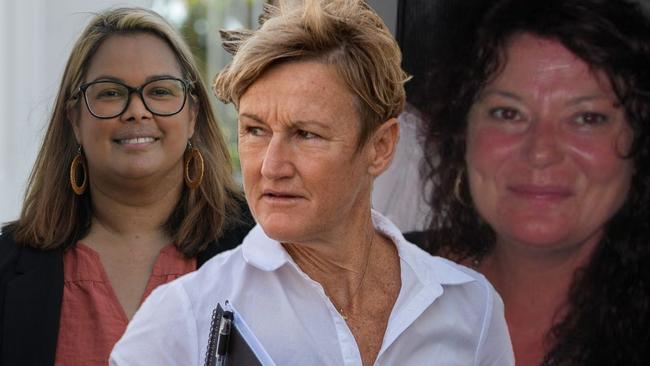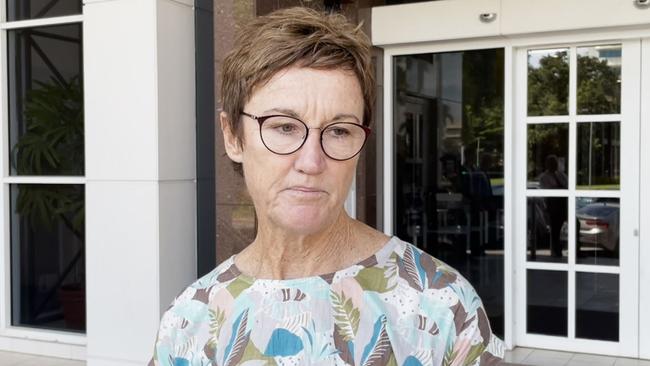Supreme Court reveals why case against NT Children’s Commissioner Colleen Gwynne was dropped
The reasons for the abrupt end to the trial of Children’s Commissioner Colleen Gwynne have been revealed.
News
Don't miss out on the headlines from News. Followed categories will be added to My News.
The “state of mind” of the Territory’s Children’s Commissioner during an alleged abuse of office proved to be a key element leading to her high-profile Supreme Court case being dropped.
Justice John Burns released his 35-page decision on Tuesday, two weeks after the trial against Colleen Gwynne ended abruptly.
Ms Gwynne was found not guilty of one count of abuse of office, after being cleared of allegations she unlawfully interfered to promote her friend Laura Dewson as her second in command.
Justice Burns concluded that for the charge to be proven, prosecutors would need to establish she did not honestly believe her former police buddy was “the best candidate”.
In her opening address for the prosecution, Georgia Wright alleged that not only did Ms Gwynne not declare her conflict of interest, but she also “a misleading negative reference about another candidate” — the current acting Children’s Commissioner Nicole Hucks.
“The accused was driven by malice towards the other candidate,” she alleged.

Ms Wright said she would have to prove Ms Gwynne’s actions were an “intentionally arbitrary or an abuse of process” to “ensure that people are employed on merit alone and by impartial decision-makers”.
“Without favour to private interests, such as friendships or family relationships or financial interests,” she said.
However, conflict emerged between the legal teams as to whether the Crown had to prove that in doing so, Ms Gwynne believed she was interfering in the selection of “the best candidate”.
Justice Burns said the question of Ms Gwynne’s belief over “who was the best person for the job” was a key element in proving she acted “arbitrary” or that it was an “abuse of process”.
In the Crown’s submission, Ms Wright said: “The question was about suitability, merit principle, not who was the best person for the job.”
She said it was “academic” and irrelevant whether or not Ms Gwynne honestly thought her friend was the best candidate, with the charges related to steps she allegedly took to secure that role for Ms Dewson.
“A belief by the accused in the appropriateness of the outcome she sought is not a determinative fact for liability for the offence,” Crown submissions said.
Justice Burns said important terms like ‘abuse of process’ and ‘arbitrary’ were not defined by the Criminal Code Act, posing “significant difficulties in interpretation”.
“The exceptionally ill-defined nature of the offence created by s 81 … requires careful attention to the legislative intention in enacting the provision,” he said.

In referring to the 2017 Explanatory Statement to the Independent Commissioner Against Corruption Bill, Justice Burns found: “This charge cannot be made out in relation to a public officer who was trying to do the right thing but adopted a poor process”.
“Poor practices are a matter for disciplinary action rather than a criminal sanctions,” the statement said.
From this, Justice Burns concluded that Ms Gwynne’s “state of mind” was “a state of affairs in which the acts and omissions alleged by the Crown occurred”.
Justice Burns said this was not implying an extra element into the offence, but explained the “the proper approach” when interpreting the law.
He said this would allow public servants to understand the line that “distinguishes administrative fault from criminal culpability”.
“If the jury are satisfied that the accused acted with more than one purpose, in this case both the purpose of having a friend appointed and having the best person appointed to the position of Assistant Children’s Commissioner, the jury may only convict the accused if they are satisfied that the accused would not have acted as she did but for the desire to have a friend appointed to the position,” he concluded.
More Coverage
Originally published as Supreme Court reveals why case against NT Children’s Commissioner Colleen Gwynne was dropped





